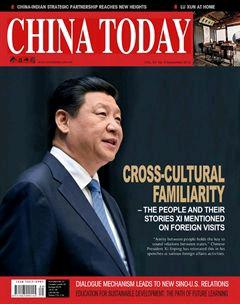What Has China Brought to Africa?
Following a series of African leaders conferences in the EU, China, India, and Japan, the U.S. held the first U.S.-Africa Leaders Summit in Washington D.C. from August 4 to 6. The high-level meeting saw the announcement of a US $33 billion-investment in Africa, in sectors such as construction, clean energy, banking, and information technology, to propel economic and trade relations between the U.S. and African countries. Meanwhile, the U.S. laid down plans to catch up with Europe and China in terms of influence in Africa in sectors such as infrastructure and production.
It is widely known that China surpassed the U.S. in 2009 to become Africas largest trade partner, with a trade volume of US $91.066 billion. Devoid of a political agenda, ChinaAfrica economic cooperation is a welcome development on the continent. In 2013, the China-Africa trade volume exceeded US $210 billion and Chinas accumulative direct investment in Africa was more than US $25 billion. Last year when Chinese President Xi Jinping visited Africa, he promised US $20 billion-worth of loans, mainly earmarked for infrastructure construction.
In the past few years, China has indeed rendered visible and growing assistance to Africa.
The East Africa railway project that China financed – one of the highlights of the construction drive – is underway. The line runs through Kenya and extends to Uganda, Rwanda and South Sudan. Completion of the first stage of construction is expected by 2017. The infrastructure project, the largest in Kenya for a century, will replace the dilapidated line built in colonial times under British rule, making East Africa a competitive investment destination.
In the past three years, China has written off 16 interestfree loans totaling RMB 1.42 billion to the nine heavily indebted countries of Tanzania, Zambia, Cameroon, Equatorial Guinea, Mali, Togo, Benin, Cote dIvoire, and Sudan.
The recent Ebola outbreak on the African continent has caused concern among people around the world. As early as April, the Chinese government announced that it would provide aid worth RMB 1 million for disease control and treatment respectively to Guinea, Liberia and Sierra Leone. In August, China again sent humanitarian relief worth RMB 30 million to these three countries. The consignment comprised medical supplies, including protective clothing, patient monitors, sprays and medicines, to help fight the Ebola virus. China also sent medical teams to provide technical aid to local doctors in the three countries.
Chinas ready assistance has won praise from the World Health Organization (WHO) and African countries. In a statement on August 8 Dr. René Zitsamélé-Coddy, WHO representative in Guinea, expressed gratitude for Chinas contribution.
“China and Guinea are both developing countries. China is now engaged in its own disaster relief work following a serious earthquake, so the Guinean government and our people are very appreciative of the aid provided by the Chinese government and the Chinese people,” Guinean International Cooperation Minister Dr. Koutoubou Moustapha Sano said in a statement to the media. “Since Guinea proclaimed itself an independent republic, China and Guinea have formed a deep friendship. The friendly cooperation between the two countries serves as a paradigm in the international community,” Dr. Sano added. When the Ebola virus broke out, Guineans received material help and emotional support from their Chinese friends. “Time is life. Guinea will use the aid materials appropriately to benefit its people,” Dr. Sano said.
For more than 50 years, Chinese health care workers have made a total of 18,000 visits to Africa and administered 250 million treatments.
Apart from the medical sector, China has provided Africa with assistance in education and technology. Over the next three years, China will help train 30,000 African talents in various fields and give 18,000 scholarships to African students. During his state visit to Africa, President Xi Jinping said that efforts should be made to enhance technology transfers to Africa and the sharing of experience.
Therefore, despite the unfounded defamation that China is exercising “new colonialism” in Africa, as insinuated by certain Western media, the facts speak for themselves. China is a true friend of Africa.

